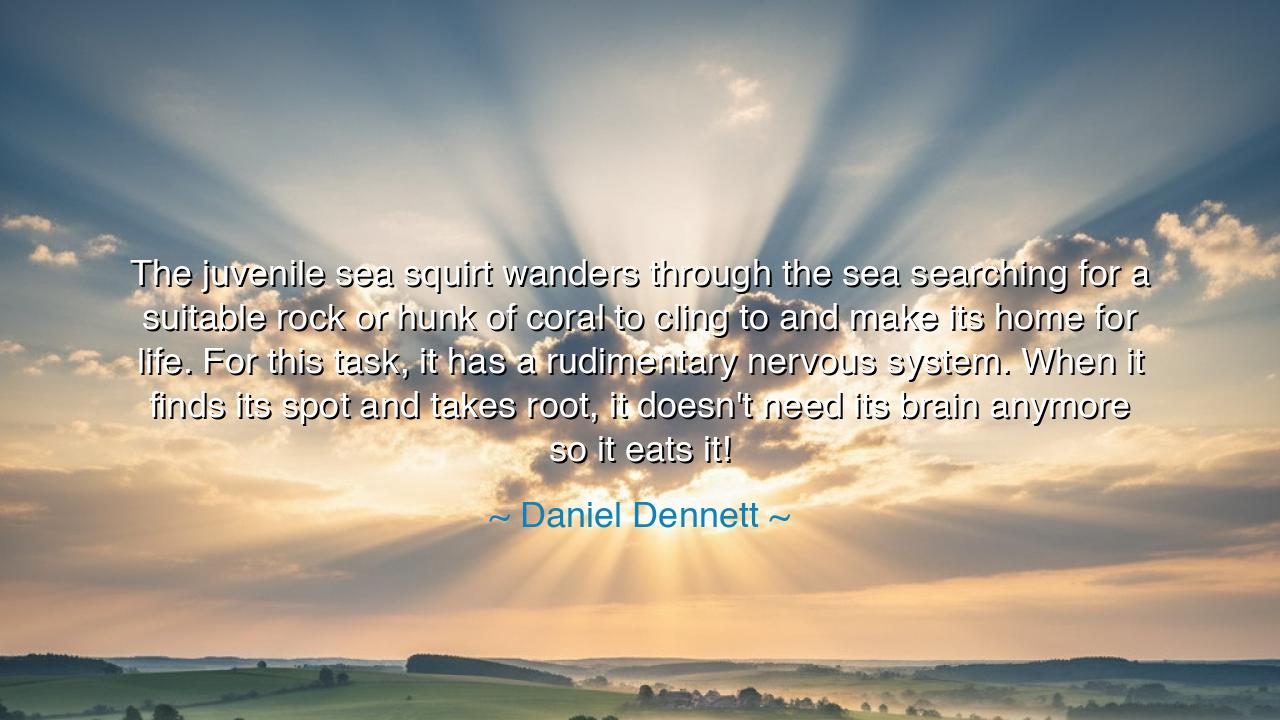
The juvenile sea squirt wanders through the sea searching for a
The juvenile sea squirt wanders through the sea searching for a suitable rock or hunk of coral to cling to and make its home for life. For this task, it has a rudimentary nervous system. When it finds its spot and takes root, it doesn't need its brain anymore so it eats it!






In the strange yet profound words of Daniel Dennett, “The juvenile sea squirt wanders through the sea searching for a suitable rock or hunk of coral to cling to and make its home for life. For this task, it has a rudimentary nervous system. When it finds its spot and takes root, it doesn’t need its brain anymore so it eats it!” we find a parable both biological and philosophical—an allegory of stagnation, comfort, and the death of curiosity. Beneath this description of an obscure sea creature lies a mirror held up to the human soul. For Dennett, philosopher of mind and spirit of inquiry, the tale of the sea squirt is not about marine biology, but about what becomes of the human mind when it stops exploring, questioning, and growing.
The meaning of the quote is at once literal and metaphorical. In nature, the young sea squirt must move, search, and adapt in order to survive; its brain serves as the organ of discovery. But once it finds its place and settles into immobility, its brain becomes useless—it consumes it to conserve energy. Dennett offers this as a chilling metaphor for human existence: when we cease to seek, when we stop engaging with the unknown, we devour our own capacity to think. A mind that no longer questions becomes like the sea squirt—alive, perhaps, but no longer truly living. The brain, once a beacon of exploration, turns inward and disappears into the comfort of certainty.
This parable echoes the warnings of the ancient philosophers, who spoke often of the perils of complacency. Socrates, who declared that “the unexamined life is not worth living,” might have smiled wryly at Dennett’s sea squirt. For both men, the mind is not a tool of rest but of motion—a living force meant to wander, to wonder, to wrestle with the mysteries of the world. The moment one grows content with one’s own beliefs, the moment one clings too tightly to a single idea or position, one begins to consume one’s own intellect. Thought decays in the absence of movement, just as muscle weakens without use.
There is a historical echo of this truth in the story of the great Chinese admiral Zheng He, who sailed the seas in the 15th century, commanding vast fleets that reached the shores of Africa and Arabia. His voyages were acts of discovery, proof of China’s boundless curiosity and capability. Yet after his death, the imperial court, seeking safety and stability, turned inward. The ships were burned, the maps destroyed, and exploration forbidden. The empire, vast and powerful, became like the sea squirt—it had found its “rock” and attached itself to comfort. The brain of its civilization, once restless and radiant, was consumed by fear of change. In that decision lay centuries of stagnation, a parable of how even nations can eat their own minds when they stop venturing beyond the known.
Dennett’s warning is thus not confined to the realm of the individual—it is a truth for civilizations, for cultures, for every community that would rather settle than evolve. The nervous system of a society—its thinkers, artists, questioners—must remain active, must continue to move, or the collective intelligence begins to rot. In every age, the temptation to cling to certainty—to attach oneself to a rock of comfort—is strong. But wisdom demands that we remain seekers, that we never grow too secure in what we believe we know. The mind, like the sea squirt before it anchors, is meant for the journey, not the resting place.
There is something deeply emotional in Dennett’s metaphor, for it speaks to the longing and the fear that live within every human heart. To move through life is perilous; to question is to risk disillusionment; to explore is to invite discomfort. Yet to stop is to lose the very essence of what makes us human. The brain, symbol of awareness and freedom, thrives only in motion. Each time we surrender curiosity, each time we refuse to learn something new or challenge a cherished belief, we take one bite of that brain. Slowly, invisibly, we devour our capacity to grow.
So, dear listener, the lesson is this: never become the sea squirt. Do not allow comfort to become your anchor, nor routine your grave. Keep your mind in motion—read, question, debate, wander. Let your thoughts travel beyond the boundaries of habit and certainty. Seek not only answers, but better questions. For the mind, like the sea, was not meant to be still. Life demands exploration, and wisdom demands the courage to drift into the unknown.
Thus, as Daniel Dennett teaches through this curious creature, the tragedy of the mind is not in dying, but in ceasing to think while still alive. Remember always that your intellect is a living thing—feed it not with comfort, but with curiosity. Move, search, grow, and let no rock or coral, however inviting, become the tomb of your wonder.






AAdministratorAdministrator
Welcome, honored guests. Please leave a comment, we will respond soon